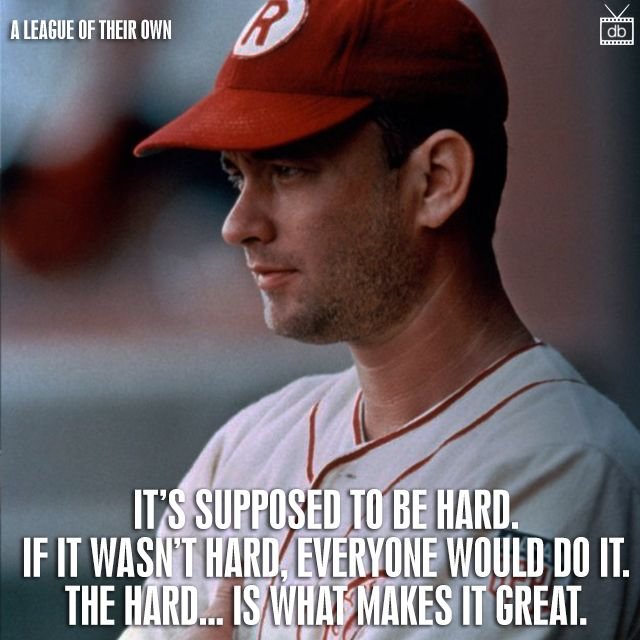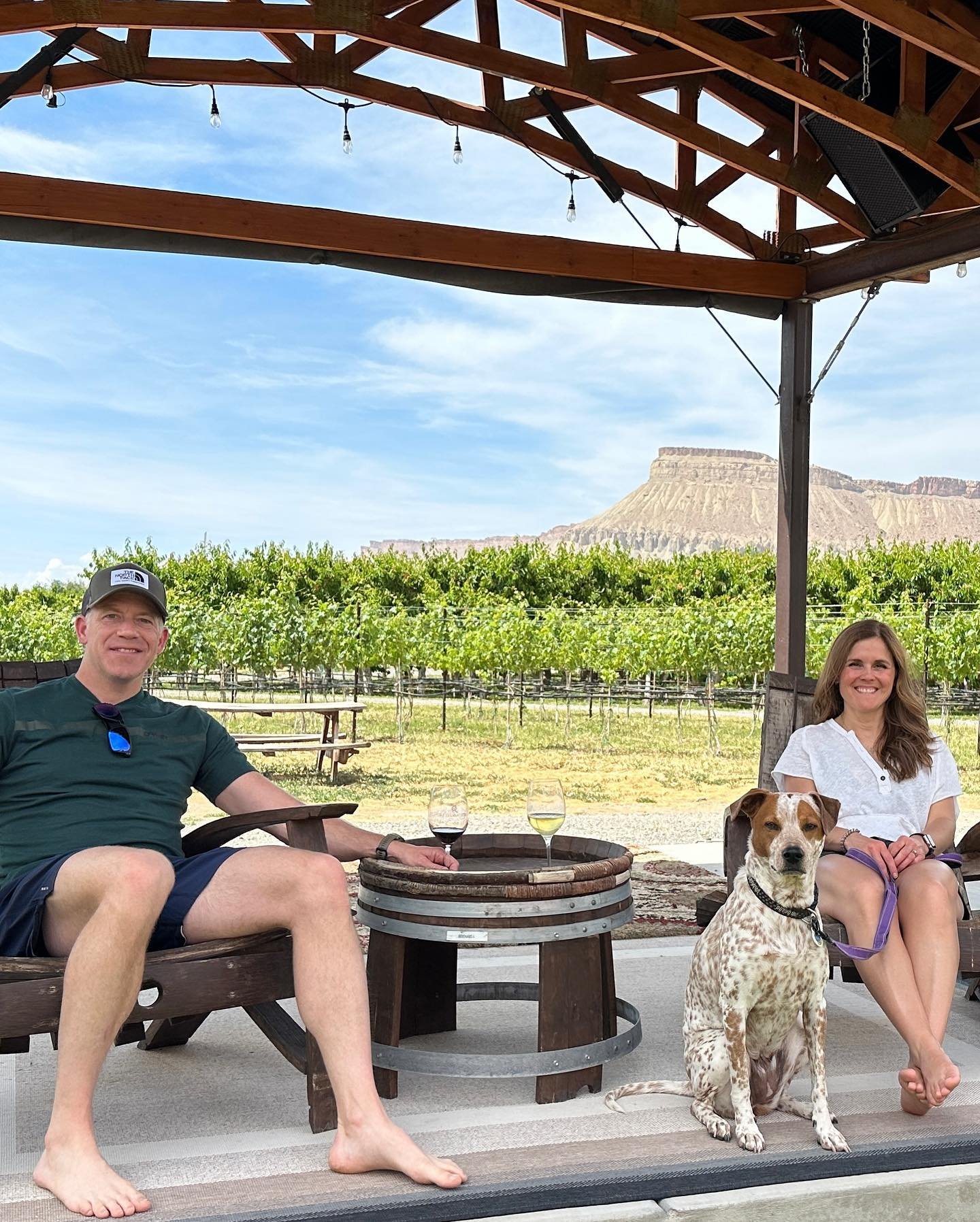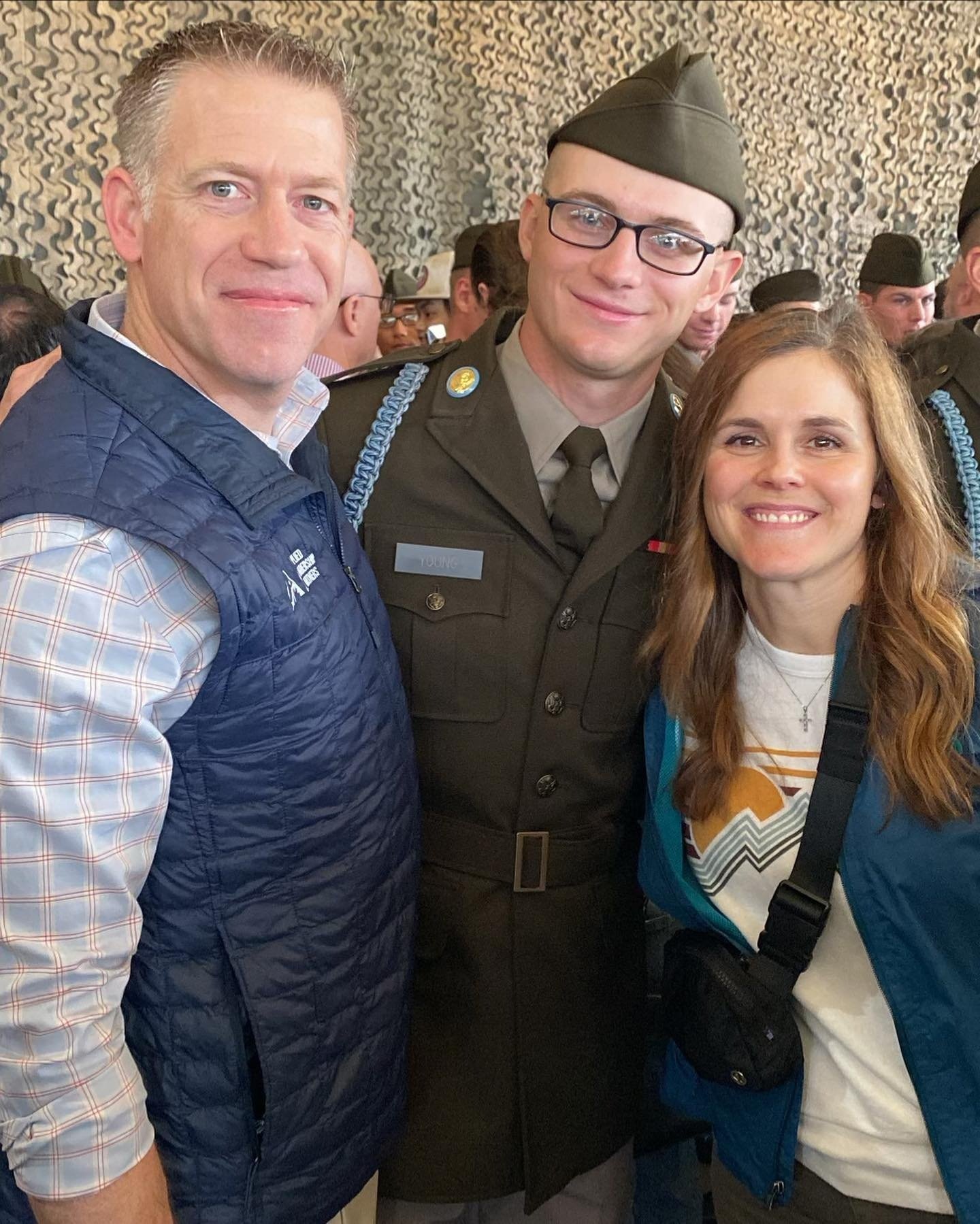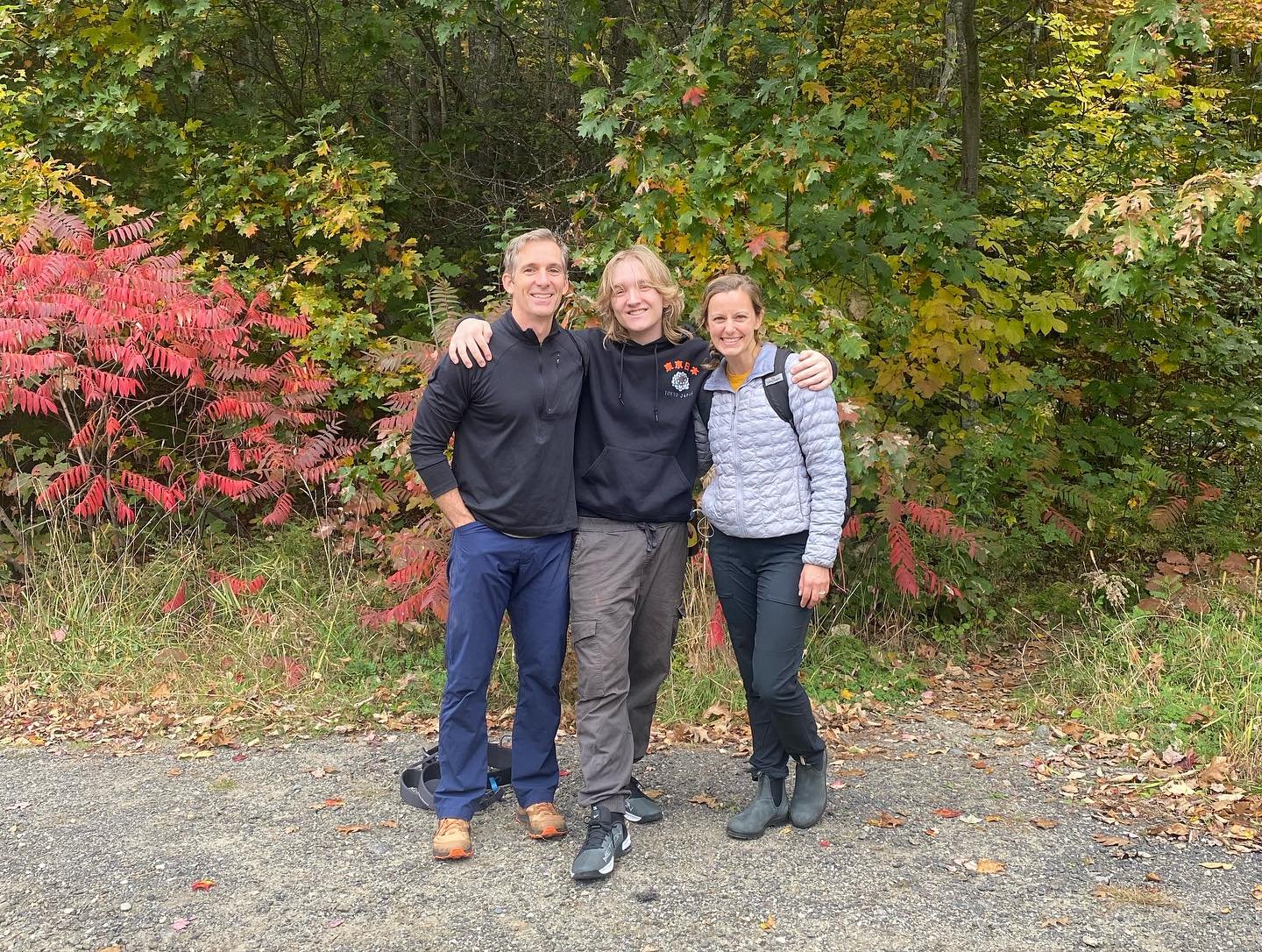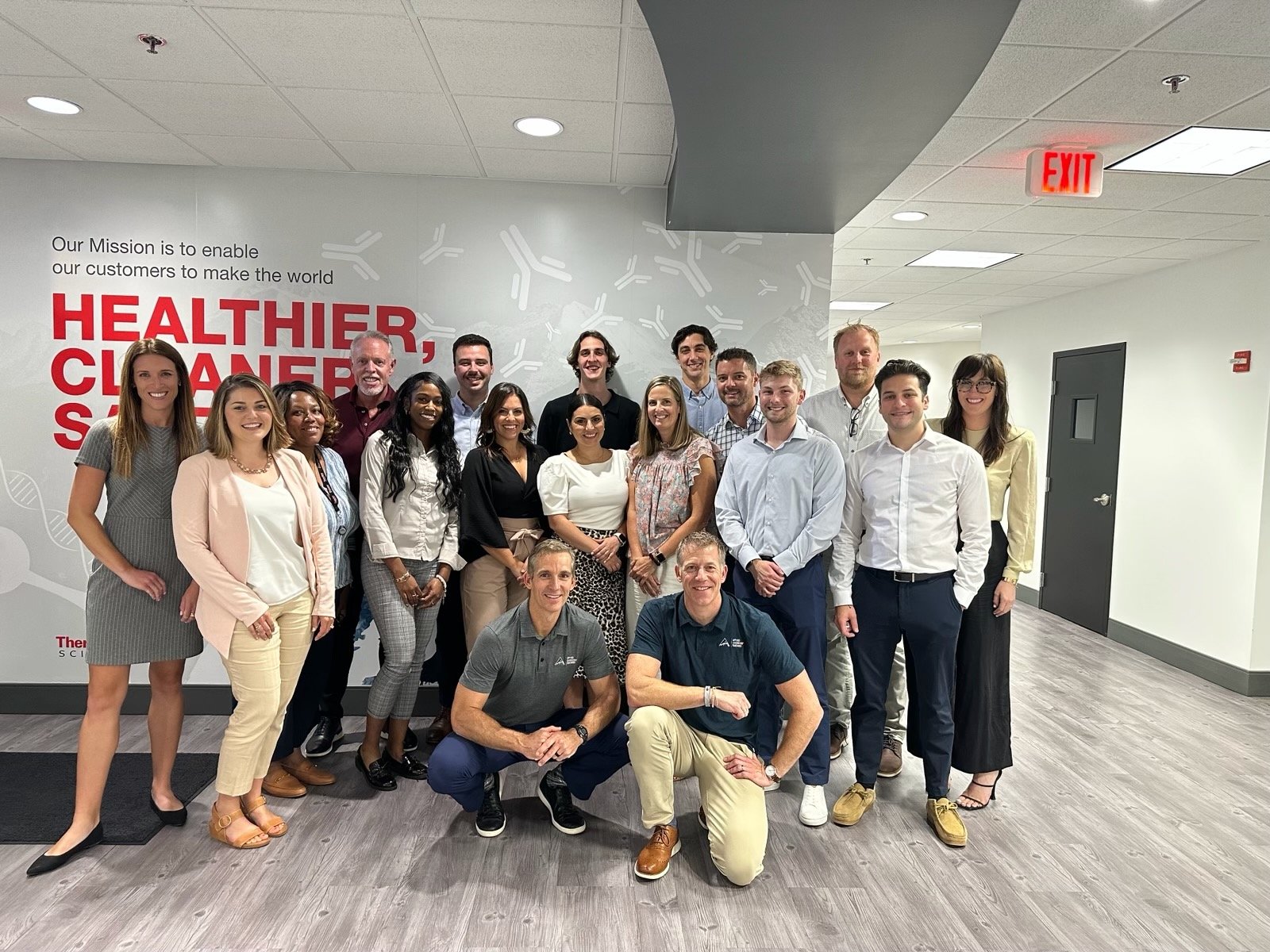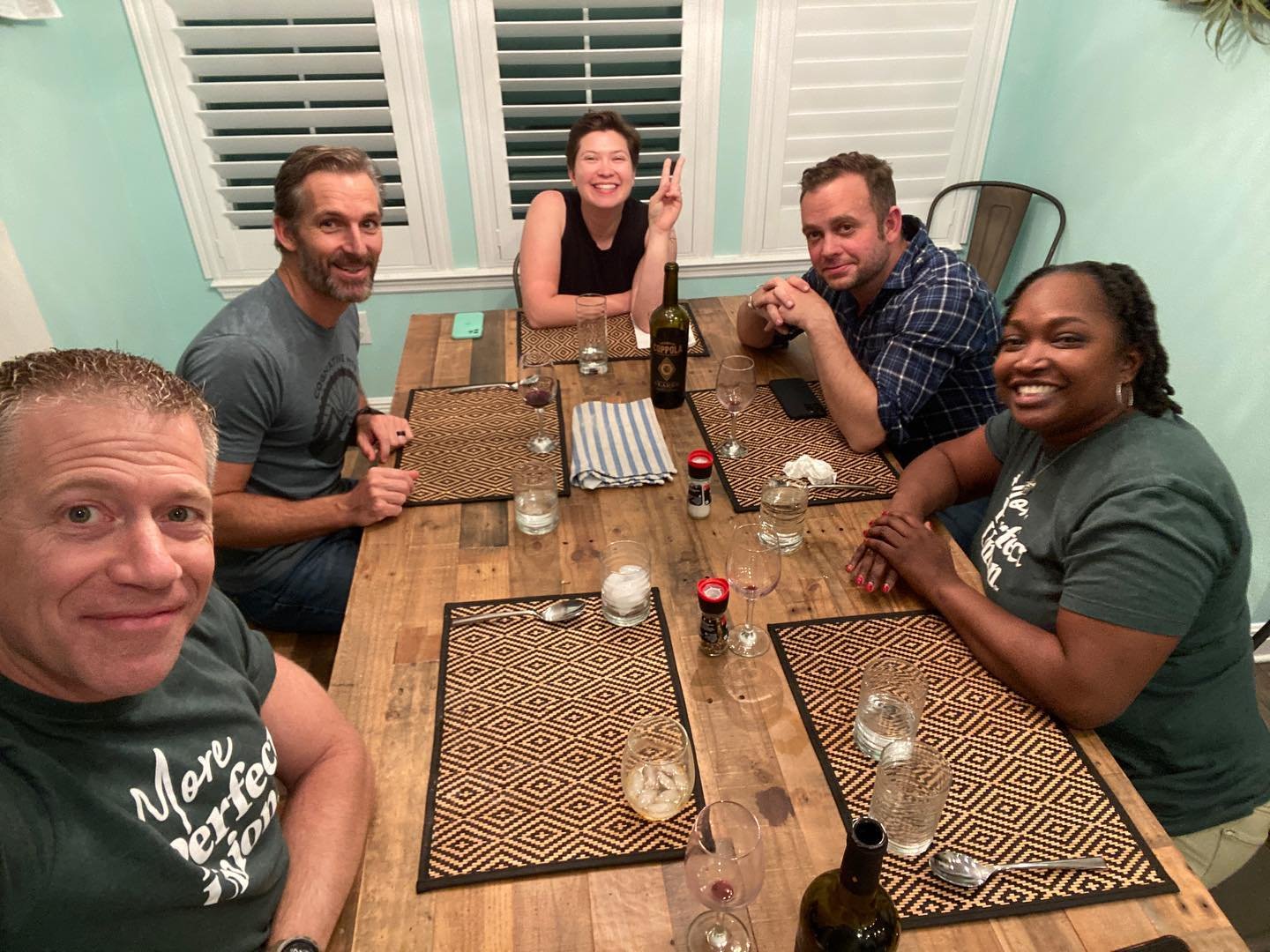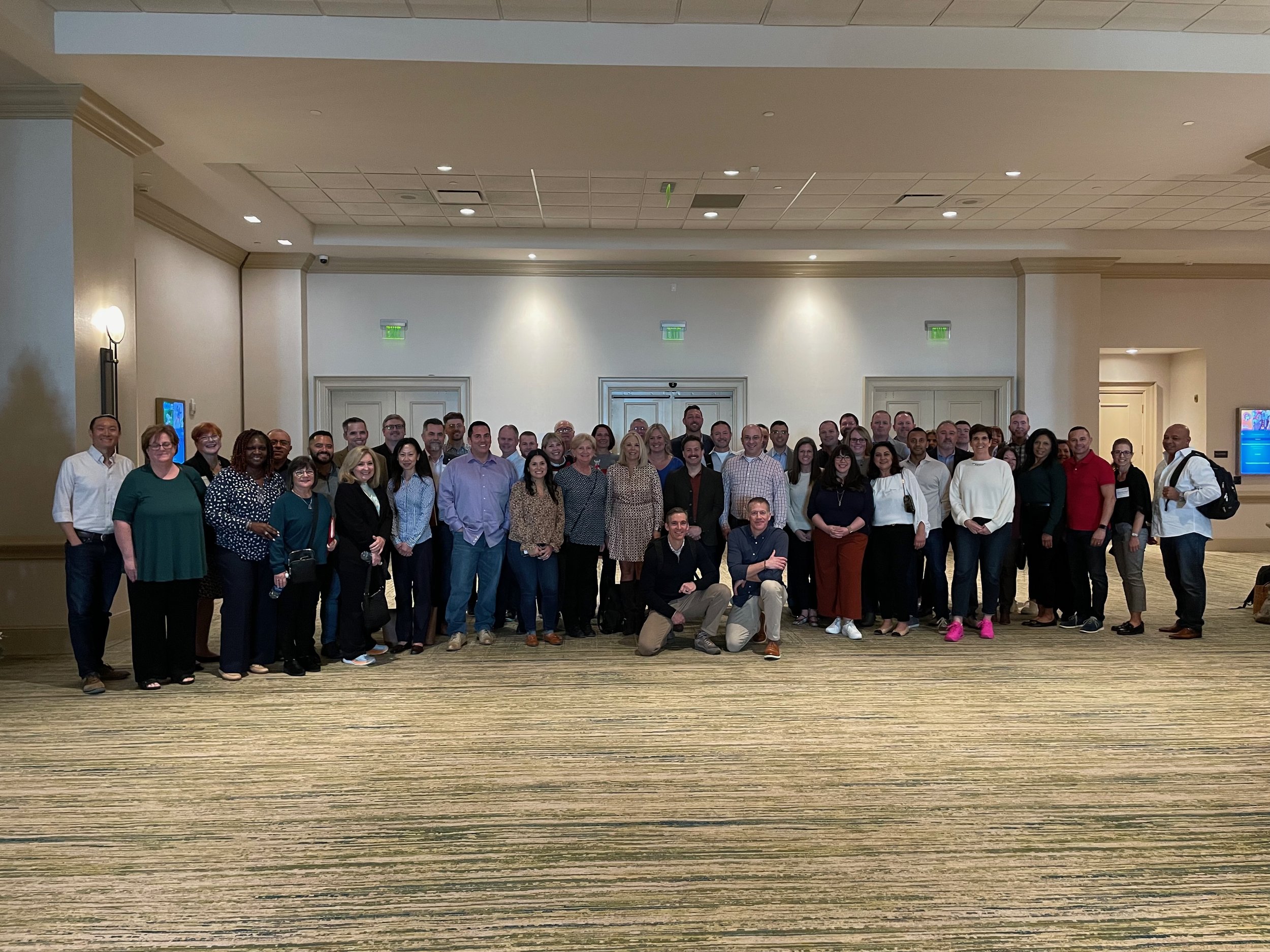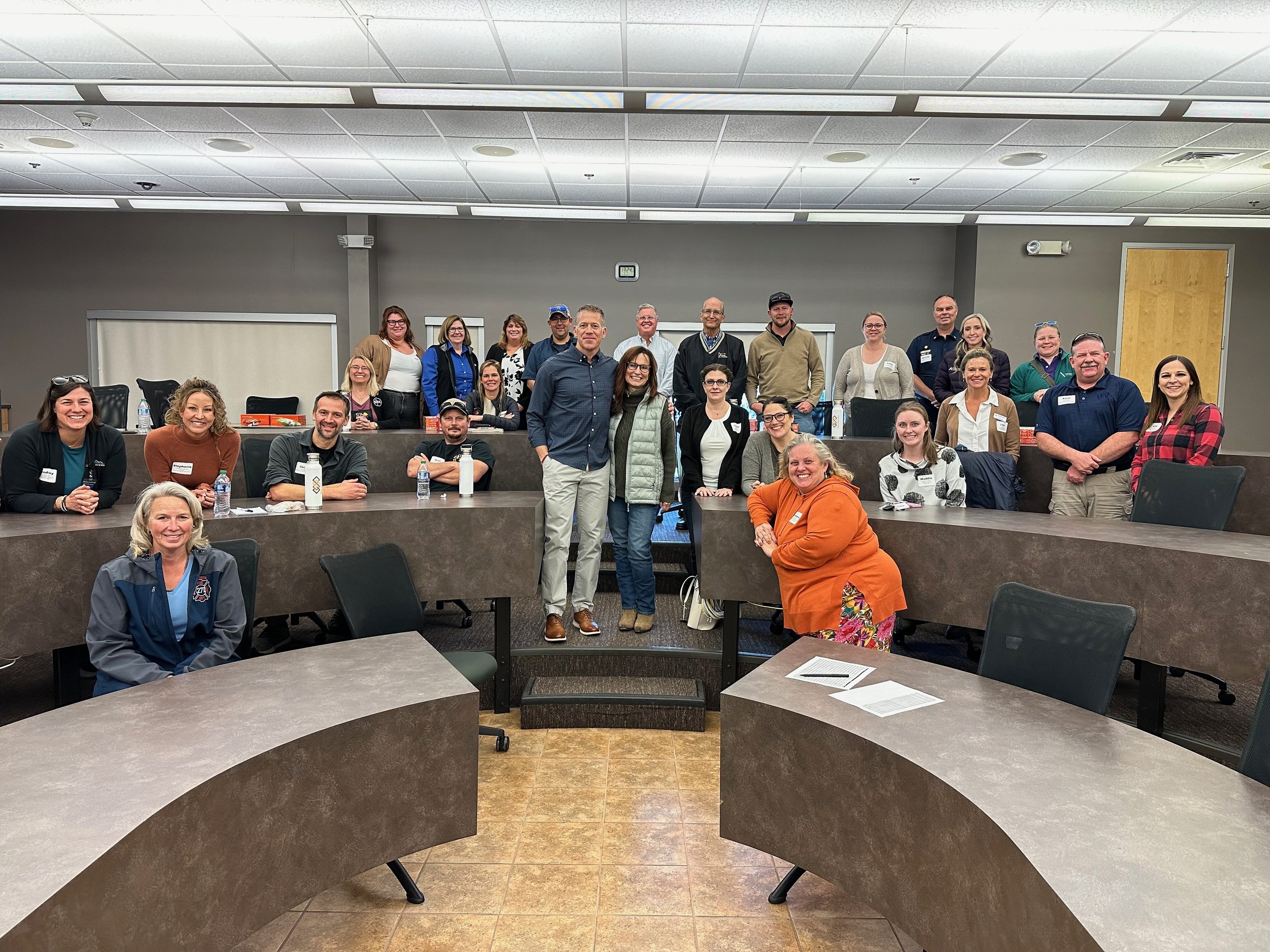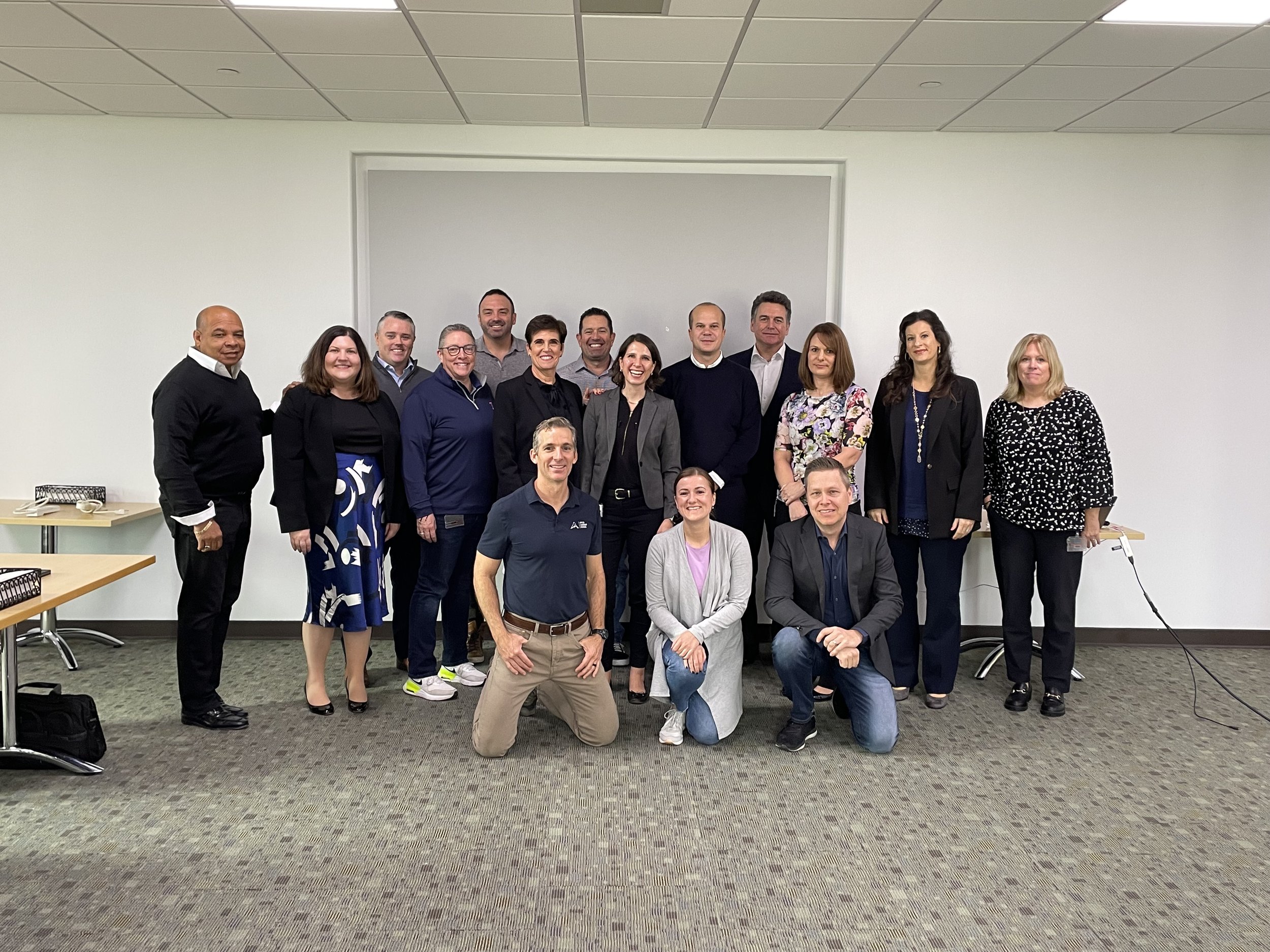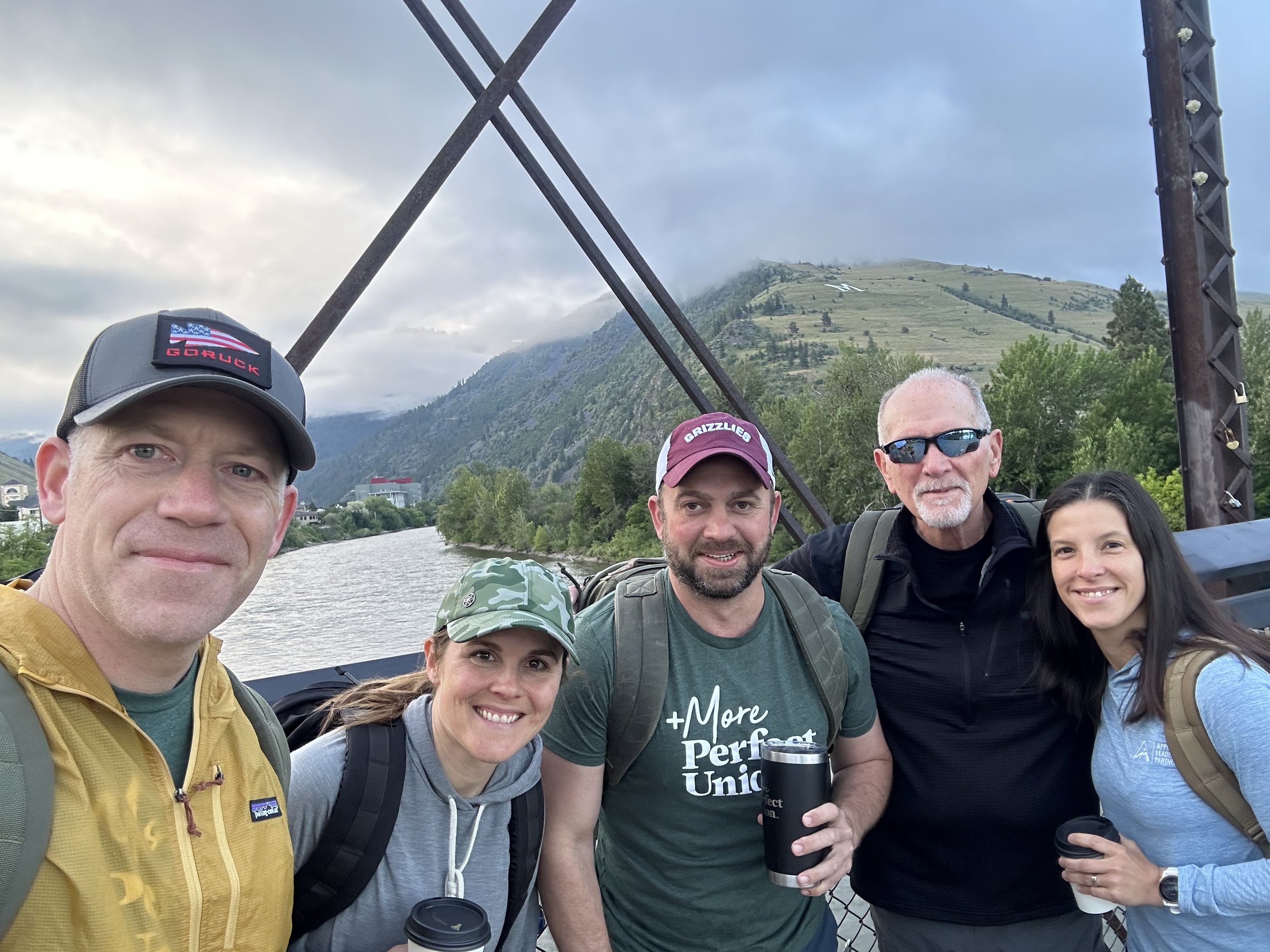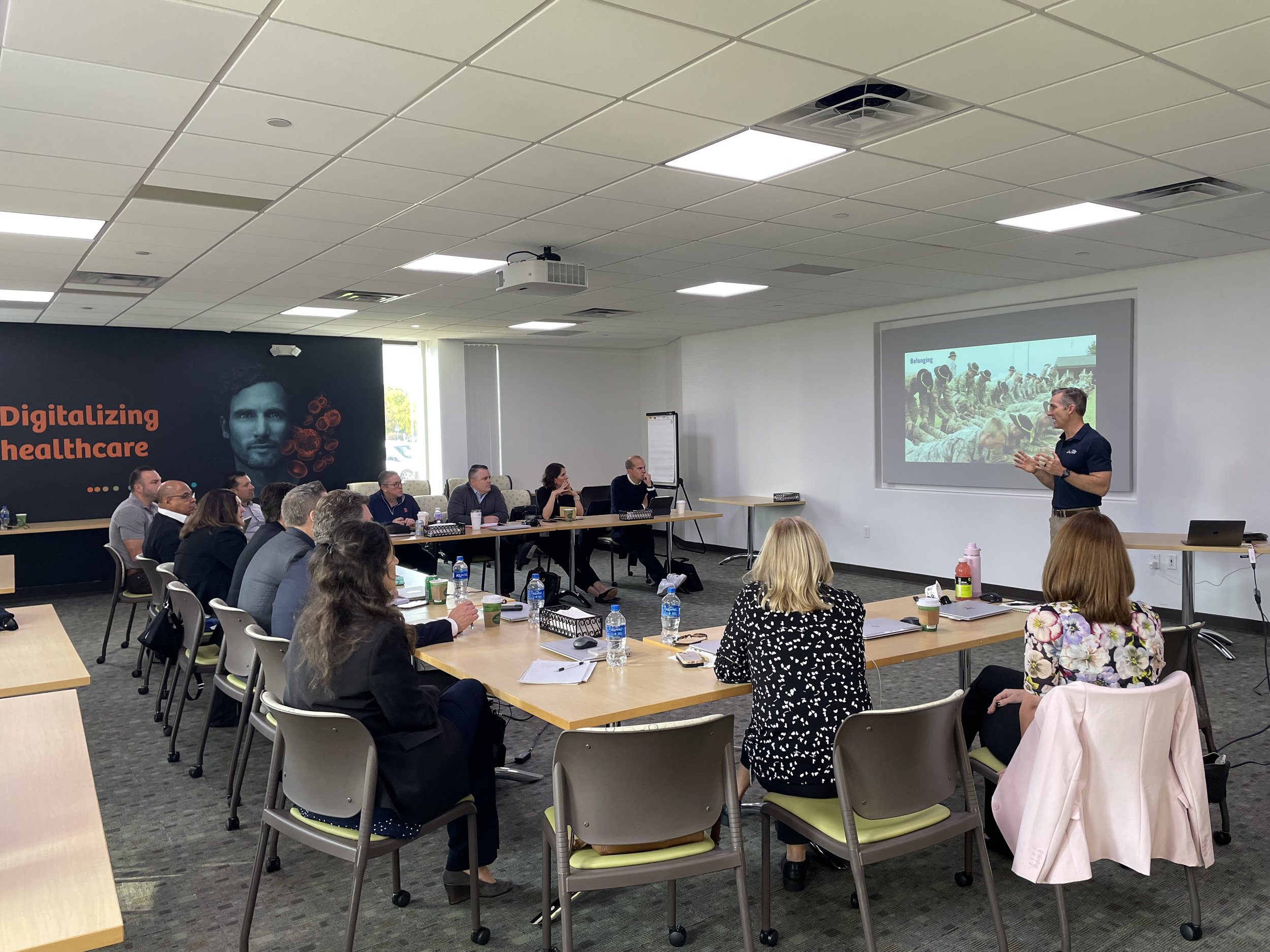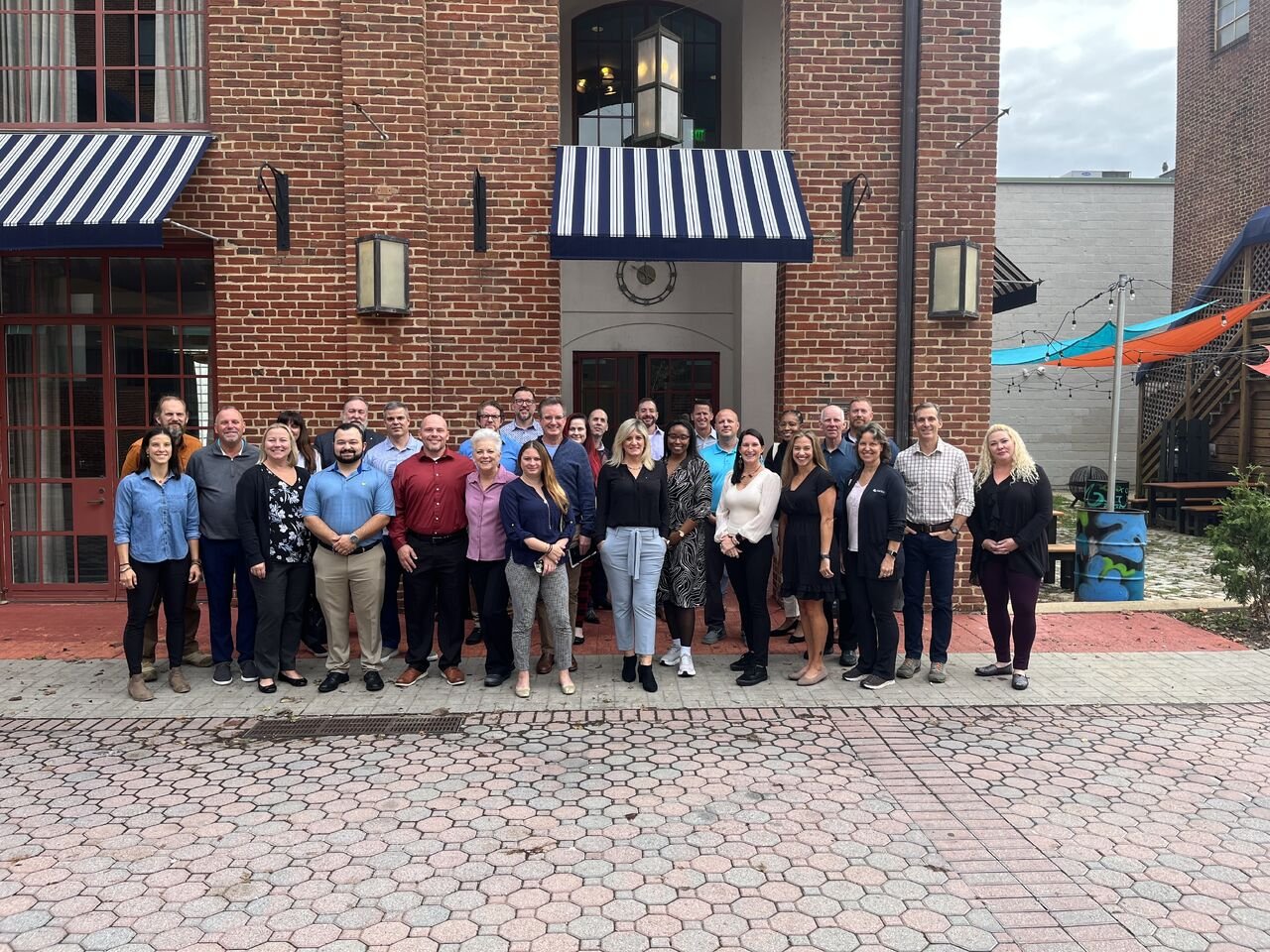We think a lot about useful practices that help us stay focused and productive. In many ways, this lies at the core of our business proposition, to help leaders increase effectiveness for the long haul. One of the most insidious parasites on our focus is screens of all types–cell phones, laptops, and tablets, oh my! Here are three simple words of wisdom to set your day off well: sunrise before screenrise.
What's Next?
Slow Down
Rangers are experts in advanced rifle marksmanship. Proficiency with your weapon system is part of the job. One of the principles we learn when spending so much time sending lead downrange is that you can only move as fast as your shot group dictates. Sometimes, I wish people could see their shot groups out in the world because it would force most of us to slow down. Many of us need to slow down.
The Most Corrosive Word in Business
Change Your Socks
I gotta admit, the mountain top is a beautiful place to be. The view is great, and the beers always seem colder (though they’ve been sitting in a pack for hours getting warm). If we linger too long, we lose the will to drive on. We run out of beers, food, light, and motivation and get blown off the backside by the wind. That’s why we have to change our socks and move out towards the next objective. But what the heck does “change your socks” actually mean? Well, I’m glad I asked 🙂…
Oh Captain, My Captain
We often say that leadership does not have to be a lonely place. We connect with other leaders doing great work in our organizations, family, friends, and teammates we work alongside. One of those teammates, inevitably, can be our team captain. And team captains are a force multiplier for any team. Find your team captains and empower them to lead.
Solve Problems vs. Win Arguments
Beware The Drama Triangle
The drama triangle occurs in relationships when there is a victim, a villain, and a hero. It’s a psychological construct introduced in the late 1960s by Dr. Stephen Karpman and is commonly used in Family Systems Therapy. An awareness of this theory is helpful in leadership because drama triangles pop up all over the place. We see them in poor performers, rock stars, and others in between. We see them in business, in families, and in friend groups. At times, we find ourselves in the midst of a drama triangle without even knowing it!
Firing People Sucks
The Power of The Written Word
BRANDON - DON’T GET INTO A FIGHT TODAY. WALK AWAY!
These words were written on a white poster board that hung above my bed when I was ten years old. A response to the last straw, when my elementary school principal met with my mom and me, pulled a binder off the shelf that was dedicated to my write-ups and explained that one more infraction would result in expulsion.
Pilot vs. Passenger
I had an all-time “proud dad” moment last week while riding a ski lift with my daughter. Our family was up at Sugarloaf doing some skiing and snowboarding for the kids’ winter break, and on Wednesday, I got to spend a couple of hours one-on-one with our 7-year-old, Penny. As a recent Florida transplant, she’s new to skiing and winter in general, but she’s really embraced it so far and enjoys being on the slopes.
Working Mom Trade Offs
“You guys are so busy. You’re always doing something. How do you keep up with it all”?
I don’t. And here’s a secret: none of us do.
I say “no” pretty ruthlessly, to adding things to our life. Just ask Matt, my sweet husband. He and I have very different thought processes regarding getting to a goal. He starts at the endgame and works his way backward: “Wouldn’t it be awesome to own an outdoor gear store/jiu-jitsu gym/blacksmithing shop,” etc., while I start pulling back on the reigns, thinking of the hundreds of considerations and steps that need to be made before we become small business millionaires. I often have to stop myself from an immediate compulsion to give a head shake and a “Nope” and reconsider something that could eventually be fun and rewarding.
There are some real-life challenges of being committed to living an integrated life as a professional, a parent, a friend, and an individual with our own interests. We all have people in our lives who seemingly have it all figured out. Their houses always appear impeccably clean, they prep meals every weekend, keeping gardens lush and bountiful, and their daughters’ hair is always styled with cute accessories, while my skills are strictly limited to ponytails.
The reality is that no one checks all of these boxes all the time. It just seems that way. Most days, we’re just trying to remember to put our overflowing garbage cans out on the curb for pick-up day and make sure everyone is fed decently, including ourselves. Some days, that’s the mark of success.
The truth is, when you’re trying to get everything right, you’re getting nothing right. No one has everything, though we can have just enough to keep us grateful. Life is one big trade-off.
Anyone who wants some quiet personal and reflection time in the morning before the day gets out of hand, especially parents, will tell you they set the alarm earlier than ever. To get that uninterrupted cup of coffee in silence, a workout while catching up on a podcast, or any other prep for the day.
When my daughter, Rory, moved out of the confines of a crib to a big girl bed last year, we (attempted) to set up some boundaries as to when she could get out of bed in the morning. She’s got a night light that changes colors, so we made some rules as to what she can do depending on the color of the light. Think red, yellow, and green like a stoplight … I’m sure some of you parents reading this did something similar. The novelty lasted a few months until she realized Mommy was up before her and, like any 4-year-old, got a serious case of FOMO and could care less about Mom’s expectations for alone time. When she came out of her room, I was doing my daily mobility exercises in the garage with my foam roller and other torture devices that inevitably became toys for her, the garage a playground.
These are the moments I realize that all my good intentions and solid leadership communication—setting boundaries, the big girl talks, and the killer night light—mean as little to her as the importance of the quiet time I’ve sacrificed 30 minutes of precious sleep for. My irritation sets in, though I cannot ignore how endearing her bid for connection is. She just wants to spend time with me. I am fully aware the day is coming when she will not want to at all, and I’ll be the one stalking her for quality time and irritating her. That’s when the Mom guilt sets in.
I get to choose in those moments to hip-fire a head shake and a “nope” to my daughter or to pause, take a deep breath (as I teach her to), rethink that “no,” and consider its impact, as I do with Matt. I’m not trying to squelch either their enthusiasm or love. Frankly, I need that just as much as I need to roll out my quads or put a plan in place for a major financial decision.
All are important, so it’s really a matter of considering the trade-offs - If not this, then what? I want Rory to know that it’s important that we care for ourselves physically and mentally and to witness Mom and Dad doing that. But not at the expense of forsaking our relationships, which are just as important to living a healthy, integrated life. I want Matt to know that we are together in our wild schemes to the end and that I am at my best with a strategy. It’s our classic couple superpower - we’re better together than we could ever be apart.
“You have to be very careful about to what (and to whom) you’re giving the best part of your day. ”
I find that being honest about the irritation and endearment are both important, not only to myself but to those around me. Being a working parent is hard. Trying not to screw up anything - my kid, my job, myself. Being a working spouse is hard. Trying not to keep score as to who is doing more housework during the week or who missed their jiu-jitsu class because the other partner is traveling for work and there’s no coverage for the kids and, at the same time, trying to support and balance each other’s individual aims and the family's dreams. But I’m fortunate to recognize these boundaries as they come up and decide to bend, not break, for the sake of what I’m truly going for - a rich, integrated life of love and meaning WITH my family, not solo.
On my grave, my headstone is not going to read, “Mediocre jiu-jitsu player, average yoga teacher, and so-so writer,” though my family is the kind of pranksters that would do that to get the last laugh. I hope every day, I’m making the right choices so that my family will decide to remember me as a loving and dedicated wife and mom. I’ll continue to make sure I make the proper trade-offs for what matters so someone else doesn’t make them for me.
Marking Our Mountaintop Moments
I struggle to remember the pain of the push to the summit, but I’ll never forget the joy of the moment at the top. Monarch Pass is 11,312’ above sea level and sits on the continental divide in the Colorado Rockies. It was the fall of 2014, and we ran one American flag across the country from the Golden Gate Bridge to Walter Reed Hospital in Bethesda, MD. We started the 3,600-mile trek on 9/11 and ended it on Veterans Day, 11/11. The Old Glory Relay was an ambitious bid from the start, and the obstacle the Rockies presented was a concern from the initial planning.
By the time the flag got to Colorado, it had already ground through the heat of the Nevada desert, the dust of America’s loneliest road, record heat in Sacramento, and a string of challenges - teams showing up late, teams showing up light, and teams not showing up at all! But Team RWB drove on to the objective and handed over Old Glory to a team of Rangers in Colorado. Now, I’m a bit partial on the matter, but if you’re going to take a hill, you call the Rangers!
On most days of the relay, we covered about 60 miles. This day–summit day–we covered 20. Twenty miles east and 3,000 feet up! We had an incredible team–a wrecking crew of Rangers, an ultra-running champion, veterans, friends, and family–and we took the hill together.
Slogging up the mountain was a fight for altitude, one-quarter mile at a time. We trailed the flag runner with two support vans, one with teammates hanging out the open door, ready to sub out and take the flag, the other collecting exhausted runners as they made the handoff. These athletes typically took down miles at a time, but this day, we took tenth of a mile chunks at worst, quarter miles at best. We leap-frogged vans, replacing tired runners with semi-fresh teammates while rehydrating and reloading calories to drive on.
Some doubled over and heaved while smiling and looking to the summit, relishing the challenge and feeling truly alive in the struggle. It was beautiful. And when we crested the hill, the shared sense of accomplishment and relief exploded into elation. We had made the summit. Hugs and high-fives were aplenty. Beers were cracked. Toasts were made. And we marked the moment. We marked the moment with our stories of one another on the climb. We recalled moments where one stumbled, and the other picked them up. We recalled the funny moments - awkward handoffs, botched van dismounts, and emergency bathroom breaks!
And we recalled the meaningful moments that carried us to the top when we thought we had run out of gas, like the two Rangers who met on the trail and hadn’t seen one another since they both jumped into Panama during Operation Just Cause in 1989. Lou was mortally wounded by the enemy on the drop zone, but Antonio (”Doc”) kept him alive. And there they were, side by side with Old Glory some thirty years later—a testament to perseverance and grit.
Marking that moment mattered. Marking our mountaintop moments always matters. And it doesn’t take running up the Continental Divide to necessitate them. We summit mountaintops in business and life all the time - a project that launched on time or before the deadline, a new customer sale, a service call that went longer than expected but didn't end until the customer was delighted, or making the Circle of Excellence for top sales performance. These and many other examples can be mountaintop moments if we recognize them for what they are and mark them accordingly.
I was reminded of this last week while Blayne and I reviewed our 2023 performance. We had another smashing year - 63% growth, plussing up the team with talent, and having a blast with leaders we care about doing big things in the world. And how did we celebrate this? How did we mark the mountaintop moment? We didn’t. We refreshed and reloaded over the holidays and got right back on the trail, hitting two big National Sales Meetings and turning in our book manuscript.
I am reminded of one of the leaders we serve perfect words about celebrating accomplishments: “I always considered myself a mountaintop jumper going from one goal to another, but I recognize that I need to pause and celebrate those moments before looking towards the next challenge.” And I am convicted to take her words to heart and celebrate right along with her. It’s time to mark this mountaintop moment before reorienting towards the next goal and moving out to achieve it. This mountaintop, and in fact all mountaintops, are cause for pause and celebration.
We owe it to ourselves, our team, and our community. It’s a time to reflect upon the long nights and late flights that got us here. A time to remember the challenging presentations and big wins. A time to recall the tough decisions that got us here and the people who carried us when we needed help. Because if we don’t, what was it all for? What is it all for if not for making the world a little better than before by doing hard things with people we care about?
As I write this today, I know we have done that. I know we’ve made a difference in others' lives and that our success reflects their successes. I can see it on my LinkedIn feed with so many colleagues celebrating their mountaintop moments, and we are committed to joining you. We’ve earned it. We’ll mark it.
More to follow on this later. Hold us accountable.
Embracing Our Greatness
Nobody wakes up in the morning and thinks, “I want to suck today!” But that doesn’t mean everyone wakes up and steels themselves to be great. I suspect that everyone does want to be great, though we often settle for average or good enough. Why?
We’ve been thinking about this a lot lately and find there are three common reasons that people don’t chase greatness: 1) greatness is hard; 2) greatness comes with high expectations; and 3) greatness can be lonely.
Greatness is the consistent achievement of our goals compounded over time. And consistently achieving at a high level is hard as hell. This is the first obstacle.
Greatness is hard. Staring down greatness gives us the reality check that it’s going to hurt. That is because it requires sacrifice. We sacrifice our time, our comfort, and our energy in the pursuit of greatness. This means that we forego a lot of easy options and downtime. It doesn't mean we have no downtime in the pursuit of greatness, but it does mean that we give it a secondary position in service to greatness. And that is damned hard because the easy options are…well, easy, and downtime costs nothing from us.
We are constantly faced with choices in our daily lives. Many of them require little thought, but some of them take some real effort, and it is these subtle but important decisions that end up moving us closer to, or further away from greatness. Like finding ourselves at 4:00 pm and knowing that we could either make one more sales call or hit the Starbucks drive-through and head for home. Greatness calls us to forego the latte and take one more crack at a difficult account before calling it a day. It’s the harder right instead of the path of least resistance. It’s a small, uphill step along the path to the summit.
Distractions and downtime seem to be always lurking around the corner in our remote work world. It’s one thing to stay focused when we’re working on a production line, but it’s not so simple when working from a computer where we can hop a window into a limitless world of options that occupy us. But we have to close those windows and get about the work that matters if we aim for greatness.
And taking that aim can feel scary because we don’t know if we’ll actually hit the target.
There’s a growing number of young people I interact with (largely young men) who are reluctant to pull back those arrows and take shots at greatness, largely because they are afraid to fail. When I ask them about it, many have shared the “What if” mixtape constantly playing in the background: What if I fail?, What if I look stupid?, What if I am embarrassed? And so on. But what if you win? That’s hard to consider over the clamor of doubt but important in the quest for greatness. This is why we’ve started asking people, “What’s the best that could happen?” right alongside the worst.
If we’re going to embrace greatness, we must accept that falling short is better than failing to try at all. We must reject the bait to run and hide and take the chance to fly.
Greatness comes with high expectations. Staring down greatness means others will expect more from us and we may not want to be in positions to let others down. We see it every year in the Super Bowl. Within the same breath, the champion is celebrated, and speculations of “next year” begin. Could he be the greatest quarterback of all time? How many contracts are up at the end of this season? What about the offensive and defensive coordinators…will they be head coaches next year? On and on it goes.
Great teams earn great expectations, and oftentimes, the reward for great work is more work! That’s the name of the game because great teams and great people can handle the expectations. They’ve earned the right to own them and the confidence to approach them. But if we’re being honest, playing from behind is easier. It’s easier to be an unknown or an underdog, but we only get one chance to be that. Once you’re found out, you’re on front street.
Though we may shy from high expectations, do we really want low expectations? Do we want others to expect little from us and resource us accordingly? Those with little expectations are given little resources. Yet, “to whom much is given, much is expected (Luke 12:48).” We’ll take the resources, so let’s also embrace the expectations and approach the target with earned confidence, a confidence that is built in the arena for the arena. And that arena doesn’t have to be a lonely place, but it often feels that way when we pursue greatness.
Greatness is lonely. Those of us who seek greatness push harder, go further, and run faster. We get ahead of the masses and stand above the crowd. We take the hard path and leave the easy walk to others. And we find ourselves alone more often than not. Not because we look down upon others or think ill of them, but because we have an internal drive and ambition that presses us on toward greatness. It’s not about me against you. It’s about me against me. I know I can do better, therefore I do better.
And while that can feel lonely, the truth is we are not alone, especially when we are on a team. Nothing done in isolation is done alone. That extra sales call that leads to a new client impacts the rep who won it, and the entire team. Don’t believe me? Watch the winning District Sales Manager at the end of the banquet night and see what happens. You will find her taking a team photo at the end of the night, trophy in hand. Because nothing her reps did in isolation was done alone.
Being great is not synonymous with being alone. Find the other weirdos who want to be great just like you do and connect with them. Drive them as they drive you. Inspire them as they inspire you. And compete with them as they compete with you.
Annual Letter 2024
Dear Friends,
It’s hard to believe that we are kicking off our fifth year in business and sending our fourth annual letter to you all. It’s been a heck of a run so far, and it feels like we’re just getting started!
Looking back on 2023, it feels like a year of completion, transition, and maturation. In both business and life, our team experienced a lot of growth and change. After three years of hard work and dedication, Brandon graduated with a Master of Divinity, Leadership from Denver Seminary. Blayne and his family traded living in sunny Tampa for 10+ years for all four seasons of Maine. We added a full-time team member and deepened our relationships with other partners and small businesses to help us advance our vision and mature our processes.
And while we’re updating:
Kelly began taking on responsibilities as Charge Nurse and led three women’s bible studies while facilitating a marriage group with Brandon.
Jeni spearheaded the effort to sell a house, buy a house, and move our family…twice! And still found time to teach yoga, learn some guitar, and be an absolutely amazing mother.
Jaden completed One Station Unit Training (OSUT) at Ft. Moore and is stationed at 1/32 Infantry, 10th Mountain Division, Ft. Drum, NY
Dylan graduated from high school (a year early), started working, driving, and getting super strong. He’ll be off to college this summer.
Elli joined the AXO sorority, made the Dean’s list in the Fall semester, and enjoyed the beginning of the Coach Prime era for the CU Buffs!
Dalton is an official teenager, is crushing Florida virtual school, and continues to blow our minds with a skateboard or snowboard beneath his feet.
Penny is becoming a star, and she knows it. She loves art and music and is totally obsessed with Taylor Swift. We’re gonna have our hands full with this one.
We came into 2023 with some momentum and kept it going with a few awesome events to start the year, including a mainstage presentation at Thermo ImmunoDiagnostic Division’s National Sales Meeting, which was an absolute blast.
Something else that we did early in the year was a deliberate, no-kidding strategy meeting in Breckenridge, Colorado, that provided so much clarity on where we’d been and where we wanted the business to go. Brandon and Blayne spent a couple of days locked in a condo strategizing and planning and then spent a weekend skiing and snowboarding with Kelly and Jeni. After that, Applied Leadership Partners was on a course for an amazing year.
Our intentions coming out of the retreat were:
Continue to meaningfully but responsibly grow revenue.
Limit air and overnight travel to (2) trips per partner per month.
Generously share truth and love in a way that creates value beyond our clients.
Continue challenging ourselves and grow. Embrace nervousness.
Maintain freedom and agency regarding how and with whom we work.
Create a functional, professional business with a small, tight, agile team.
Here is a quick overview of how we did in 2023 by the numbers, and then we’ll talk a bit more about how it happened.
61 total client engagements (24 in-person, 37 virtual). We nailed it on travel days!
Revenue was up 63% over 2022 while maintaining similar profit margins. This is actually more growth than we were shooting for and certainly stretched us at times, but we’re thrilled with it!
We added Sarah Holzhalb to the team in April as Director of Marketing and Business Development. Her work has been incredibly valuable in shoring up the business and setting the stage for future growth. The numbers don’t lie.
Marketing Year Over Year growth by the numbers (2022 vs. 2023)
Total Followers - 133%
Page and Profile Reach (users) - 292%
Page and Profile Impressions - 311%
Posts - 476%
Post Reach (users) - 306%
Post Impressions - 288%
Video Viewers - 463%
We launched a monthly newsletter that we’d love for you to subscribe to and share with friends.
We’ve had a blast recording new episodes of our refreshed Applied Leadership Podcast. We aim to release two episodes a month, and you can listen and watch on Spotify, Apple Podcasts, and YouTube.
We also sold and subsequently wrote a book! The manuscript is complete and is off to the publisher. It’s been a long, difficult, and rewarding journey so far…and we know that there is much work still to do. Please stay tuned as we work toward a big release in early 2025! If you’re interested in learning more or would like to purchase books for your organization, send a note to operations@appliedleadershippartners.com.
In 2023, our offering expanded but was also sharpened. We added some new content but also refined some of our most requested modules of instruction and found new ways to deliver them. We created and delivered:
Brilliance In The Basics sales skills training. Teaching the core, human aspects of effective selling. Participants learn and practice the skills needed to build genuine, trusting relationships and close business in the real world. This offering is suited for sales organizations that use an existing model but wish to increase sales effectiveness by improving their reps’ human dimensions of selling.
We created our Front Line Leader Program, which is designed for front line leaders, especially those newer to management roles. The program is delivered through engaging videos and an accompanying workbook. It is self-paced and able to be scaled across an enterprise. The program is ideal for companies in service industries, retail, and hospitality.
We focused more keenly on Advising leadership teams, deepening our relationship with key partners, and serving leadership leadership teams who are navigating growth, change, and uncertainty. Being in the same foxhole with these incredibly talented and committed leaders is a gift we do not take lightly.
We also upped our game in Keynote speaking and had the privilege to speak from the main stage at a number of conferences, kickoff meetings, and events.
While we worked with several new clients last year, our business is mostly growing deeper. We have some wonderful, long-term partnerships where we feel truly part of the team and are able to really understand the organization, the people, and their needs. We absolutely love having these kinds of relationships and feel that we can add so much as real partners to an organization.
In the coming year, we aim to continue doing more of the same while growing meaningfully and responsibly. We are having a great time with this work; we love the people we work with, and the primary goal is to keep it going. This business is our infinite game. We’ll do that by deepening relationships with our long-time clients, by reaching out and establishing new partnerships, through the expansion of our Front Line Leader program, and by (slowly) bringing some new faces to the podium. We’ll continue working behind the scenes on our book to ensure that it comes to life in a way that will deliver as much value as possible to everybody who reads it.
We’re also very proud that our business and teammates are making good on our commitment to servant leadership. Over the past year, Blayne served as the chairman of the board of the Armed Services Arts Partnership (ASAP) and helped them to serve over 1100 veterans and military families members through their amazing programs.
Brandon has recently joined the board of directors of Gallant Few and will be working to support the Army Ranger community. Of note, we also made $5,000 contributions to both organizations to help support and advance their missions. This is huge for us, as we started this company with the goal to be generous and give back, and it feels wonderful to be in a place where we can do this. Ideally, there will be much more to come.
Finally, we want to leave you with a few broad thoughts on the year ahead. In the way that 2021 was the year that everyone couldn’t wait to start, it feels like 2024 is one that a lot of folks would prefer to skip altogether. We know that many of you are rightfully concerned about the state of things socially, financially, and geopolitically. It seems that almost no matter who you read and listen to, they’re predicting, or at least alluding to, some form of calamity before the year is over. For our part, we can’t offer a look into the crystal ball. We don’t know what will happen in Ukraine or Gaza, and we have no clue how the Presidential election will play out. We’re not sure if inflation will get worse or better, and we can’t tell you what will happen with stock prices or real estate. Here is what we can offer, and we hope it’s helpful.
Pay Attention and Participate. Do your best to stay engaged in what’s happening in your community and the world around you. Do so in a way that gives the space for sanity and reflection. Be informed without being consumed. Take small actions where you can. Help a neighbor, vote in a primary election, go to a school board meeting, raise money for charity, volunteer in your community, or whatever makes a positive contribution, while allowing you to live your life.
Prepare. Prediction is a fool’s errand. We cannot predict an uncertain future, but we can prepare for it. Consider your circumstances and some of the variables at play, then figure out what you, your family, and your business can do to either weather difficulty, or seize an opportunity. This might look like saving a few bucks or getting healthier or repairing a relationship. It may turn out to be a rough year, and it may not, but you’ll be prepared either way.
Press On. We can’t sit on our hands and wait to see how it all turns out. Please don’t just mail it in this year. If others want to do that, fine. You’ll just be that much further ahead come 2025. Continue to invest in your skills, your team, your projects, and your family. If you’re paying attention and prepared, you can confidently move forward, knowing that you’ll be able to adapt or adjust if needed.
We’ll close this year’s letter by simply saying THANK YOU! Too many people to mention have offered their belief, support, and encouragement to us over the past 4 years, and our business and lives would not be nearly as fulfilling without it. We’re off to the races in 2024, and we can’t wait to see you out on the trail!
All our best,
Brandon, Blayne, Sarah, and the ALPs family
The Little Lights Aren’t Twinkling
Have you ever thought about (or experienced) the frustration or squabbles that ensue while decorating the family Christmas tree? What is supposed to be a fun and satisfying holiday tradition can quickly become a battle of strong opinions and absurd attempts to control the light placement and ornament styling.
This year, our family’s tree became a metaphor for everyday life.
We spent an afternoon decorating it, and what had started as a highly anticipated activity turned into a life lesson by the time we finished. My daughter, Rory, is four years old, and her awareness of, and desire to, celebrate as many holidays as possible has skyrocketed this year. My husband Matt and I took her to a Christmas tree farm, where she walked through all the trees and proudly chose the one to bring home (from the two acceptable options we gave her).
Once we got the tree up in the stand, I climbed into the garage attic and lifted dusty lids off numerous boxes filled with ornaments we’d been gifted or bought as mementos over the years. This year, we chose just a few personal ones that mean the most to us and then filled in the rest with glittery red and silver balls. I stood on a ladder, squirreling my way around the tree, wrapping the lights, trying to make them as even as possible. Rory ecstatically hung her handmade ornaments of painted popsicle sticks and molded clay. All 10 of them clustered in a two-foot area on the lowest two branches of the tree. Each time she added a new one to the already crowded section, I had to take a deep breath and hold back the suggestion that maybe she could choose a different area to hang an ornament in.
By the time we finished, half of the lights had stopped working, and I was frustrated that I couldn’t figure out why. Some of the branches still wouldn’t fall, revealing significant gaps in the trunk. There were empty spots where we missed putting any ornaments. It was the most unconventional and incomplete tree we’ve had yet. Yet, lit up in the darkened front room brought joy and warmth to our home.
Later that evening, my daughter got out of bed to go to the bathroom. Passing by the tree as she walked back to her bedroom, she stopped, looked at it, cheerfully raised her hands above her head, and exclaimed, “Mommy, it’s okay that the lights aren’t working. It’s still so beautiful!”
As usual, I was schooled in the College of Life by my preschooler.
Our days are uneven: lush and plentiful in some areas, barren in others. There are some weeks, months, maybe even years where we are just trying to put one foot in front of the other and maintain some equilibrium, going through the motions. Other times, we’re cruising through new adventures and milestones and checking off the bucket list. Both are important. Those moments when we feel “in the middle,” we are still moving forward. We can plant the seeds for growth and nurture progress to more abundant days in the future.
There are gaping holes that can’t be covered. There will be failures, shortcomings, and difficult times. Be transparent with your struggles and challenges. Writer Annie Dillard stated, "If we want our lives to feel meaningful and have gravity, we need to ensure our days feel meaningful and have gravity, too.” Let the holes in your life remain uncovered so the light can shine through and show you what is possible. You never know when you could be the light for someone’s hope for better days and improvements. Shame cannot survive the light.
No matter what, it’s beautiful if you take the time to look. The effort and love we put into decorating the tree and making it ours is what makes it special. In yogic and Stoic philosophy, all things are neutral. It’s the personal labels we put on things and situations that make them appealing or repulsive to us. With the tree, and in life, we can put a microscope on it, expose all the tiny ugly parts, and deem it awful. Or we can step back, take the entire picture in, and observe it as a whole entity.
Most things we stress about truly don’t matter. It doesn’t matter that Rory’s artistic choice was to put all her ornaments in one spot or that not all the lights don’t work. Trust me, we aren’t in the running for a home decor award from Southern Living. The more we learn to leave “what is” alone, especially the difficult stuff that does matter but we have little to no control over, the more acceptance and contentment will steadily find us. Acceptance also doesn’t mean apathy and disregard. It means knowing what we can change and not letting what we can’t have rent-free space in our brains.
If you view life in bits and pieces, you’ll always change your mind about whether it’s good, joyous, terrible, or tragic. Observed together, all the broken pieces come together, and we can raise our arms in the air and proclaim its beauty. The ordinary, well-lived moments add up to an extraordinary experience.
This week, a visitor to our house commented, “Where are all your ornaments? The tree is pretty bare”. I replied that we added our favorite decorations, what we deemed essential. For me, the experience of this year’s tree will go down in our family history as the most loved and remembered. I pray I feel the same about life as each year closes, hoping the next year will be the best, focused on the beautiful essential pieces of it.
Imperfect, In Earnest
If you’ve looked around lately, you’ve surely noticed that the world seems a bit troubled at the moment. And while it’s hard to know if it’s any more or less troubled than normal, the vibe certainly feels particularly heavy right now. And if you’re anything like us, you’re probably spending at least some time thinking about what you can/should do about it, which is a very difficult question to answer.
On one end of the spectrum, we could simply throw our hands up and just say, “the hell with it”. We could easily decide that the world’s problems are too big and too many for any of us to do much about it…so let’s just have some fun and let it burn.
On the other extreme, we could decide that we need to solve all of the world’s problems and not take a moment of rest until we do! We might feel like there is no time to waste - no time for fun or joy or humor or relaxation, because the fate of the world is upon our shoulders.
Clearly, there is a lot of room between the two ends of the spectrum, but finding the proper balance can be hard. How do we exist and participate in a world that needs so much work? How do we use our precious time on this earth to both make it a bit better AND enjoy our lives? This is a question that has been on our minds and we’re hearing from our partners too. We’ve heard it most often from our fellow military veterans. Those wired and trained for service can find it particularly tricky to manage this dynamic.
So this Veterans Day, we’re sharing some thoughts that we hope will provide you with some perspective and encouragement as you navigate life in a world that can feel a bit overwhelming at times. First, some perspective…
Armistice Day
Many of you may know this, but Veterans Day was originally introduced as Armistice Day. The 11th hour of the 11th day of the 11th month (11/11/1918) marked the end of hostilities in WWI. Of course, back then it wasn’t called World War One, it was known as "The Great War" or by some as "The War to End All Wars". Looking back over the 100 or so years since, it is obvious that it was not the world to end all wars. Less than 20 years later, Europe and eventually the entire world was aflame with WWII. Then only five years later there was Korea. Then Vietnam…and on and on it goes.
Whether we like it or not, our history is marked with a continuous string of armed conflicts, and while we can all hope that this trend will change in the future, our history (and our current observations) suggest that likely isn’t the case. We think this is a big reason that we continue to revere and honor serving in the military and make a big deal out of Veterans Day…because while we can and should pray for peace, we know that war is a part of our lives.
Struggle and Progress
Wars are not the only challenges our nation has experienced over the past 100 years. While international conflicts provide notable marks on the timeline, we’ve had plenty of domestic struggles and many victories too. We’ve been constantly confronted with things that simply do not live up to our ideals. And in many cases, we’ve fought to reconcile and overcome them. From women's suffrage to the New Deal to Civil Rights to Technology, we've had to face our flaws, and try to find a better way. America is a complex and unique place. Our history is full of things for which we should be incredibly proud, and others for which we feel embarrassed, even ashamed. There is an inherent messiness that comes with the pursuit of big and great things. And it can be difficult to wrap our heads and hearts around this messiness, but we believe that we must. Because just as America has done over the past 250 years, we each strive, in our own way, to move forward, imperfect yet in earnest.
Our Choice
This complexity and inescapable messiness is what we are all faced with everyday in our own lives and careers - this dichotomy of what's broken and what's possible. We see it all around us, in ways both big and small. We can’t help but recognize so many ways in which the world seems beyond repair, but if we look closely, we can also see so much cause for hope. If I wake up early in the morning and read the news, I might be totally bummed out. But when I go get my little daughter out of bed and she asks for a snuggle, all seems to be right in the universe. It seems that things are not totally dark nor totally sunny, there is both, and we have to accept that.
If we truly care about making things better, we must be willing to acknowledge what we find wrong, ugly, and in need of change, AND we must be able to see the beauty and humanity and possibility in the world. Veterans, if anybody, can certainly appreciate this. We have seen the absolutely horrific things that people can do to one another AND we’ve experienced the astounding power of brother/sisterhood. We’ve watched unspeakable destruction AND we’ve witnessed unimaginable kindness in the midst of that destruction. So what do we do with all this? We can see it all, the good, the bad and the ugly - but what we choose to focus on is what will make all of the difference. We get to decide how we manage our limited resources. We get to choose whether we want to be totally disengaged, totally overwhelmed, or perhaps something more productive. We encourage you to find a healthy, middle path.
Some Encouragement
Our Veterans Day message to you is this. Whether you are a Veteran or not, here are some things that will help you to effectively navigate a world that is so full of both challenge and opportunity:
1. Stay in the Fight. Do not be discouraged or dissuaded or otherwise convinced that you do not matter or can't make a difference. You do and you can. We need you engaged. You can’t help if you don’t show up. When things seem tough. Just keep going. As we always said at Ranger School, you never quit at night. Just keep going till daylight and see that doesn’t help you stay with it.
2. Look it in the Eye. Don't be afraid to acknowledge challenges and difficulties in the world...or in your own life. There’s plenty we’d prefer not to see, but we can’t just look away. Accepting that something is wrong is the first step in addressing it. Just because something is wrong, doesn’t mean that everything is.
3. Do What You Can. Stay focused on what is within your control/influence. Don't be overwhelmed or distracted. Ounces make pounds and pennies make dollars. And small things don’t just add up, they compound! Progress can be slow, but will accelerate if we keep making deposits.
4. Do It Together. Veterans understand the power of teamwork and camaraderie. And we know that when we put the mission first (ahead of self, identity, background, etc.) we can accomplish great things. Do not go it alone! Lean on each other. Invite others to join. And if things do feel like too much, reach out, and get connected to help.
Bottom Line, We Need You!
We know that it is easy to look at your TV or laptop or phone and see all of the ways in which the world is struggling. It’s also easy to throw our hands up and convince ourselves that the problems are too big and too far away for us to do anything about them.
We don’t want you to look away from those things, but we also don’t want you to be consumed by them.
Whether it is across the globe, in Washington DC, down the street, or at your kitchen table - we want you to recognize the flaws and the possibilities. We want you to remember that your efforts will not be perfect…but that nothing done in earnest is ever done in vain. If we do that, we can continue to make our lives, communities, and the world a better place...together.
HAPPY VETERANS DAY!
The Unknown Distance March
We originally posted this blog in March 2020. With the recent shooting in Maine, the war in Israel, and other events, life feels especially heavy. We felt sending this piece out again was timely, as we try to remember to stay on the path and lean on others when we need to.
~~~~~~~~~~~~~
There’s a reason why the Rangers, the Green Berets, and many other Special Operations Units use unknown distance ruck marches to assess candidates during selection and build grit and resolve during training. The ruck is often called “the ultimate equalizer”. It can make a 250lbs linebacker fall by the wayside while a 140lbs teenager drives on. The ruck does not discriminate and it does not relent.
But those who really know, know that the unknown distance march isn’t about the weight of the ruck or the number of miles covered.
It’s about the uncertainty – the ability to persevere through continuous hardship for however long it takes. It’s about learning to focus on the mission, not the moment.
Ruck marching is a painful endeavor to begin with, even when you know how far you’re traveling. But walking an unknown distance at night over punishing terrain teaches you a lot about yourself and your teammates.
The one penetrating thought that seeps into your mind amidst the strain and the pain is whether or not you will quit. Will you break when it gets hard, the finish line is nowhere in sight, and you just want it to end? Or will you find the strength to keep pushing, to lean on your teammates, and complete the mission? Sadly, it’s the ones who take a knee on the side of the road that never get back up and never see what’s at the top of the hill.
In 2006, I had the privilege of competing in the Best Ranger Competition and the unknown distance march put a microscope on my resolve and my reliance upon my teammate. Jeremiah Pittman and I stepped out, like the rest of the teams, at “0-Dark-Thirty” and I knew it was going to be a rough night. Seven years earlier, I had learned an important lesson about myself during the grueling 61 days of Ranger School. You can starve me, you can smoke me, you can load me down with weight and you can make me walk for days on end. But sleep deprivation is my weakness.
The Best Ranger Competition is like an Ironman on steroids. It’s 60 miles in 60 continuous hours with no sleep, interlaced with common Ranger tasks and tactics like shooting, land navigation, parachuting, obstacle courses and other events to push the limits of endurance. The mission for every competitor standing in their two-man buddy teams at the starting line is simple: cross the finish line. Most do not accomplish their mission. The march started after the first 20 hours of non-stop competition, and I was exhausted. Though always a strong ruck marcher, a few miles in I was droning (falling asleep while walking) and hallucinating. We had no clue how long the event would last. The only instructions were go! Until you’re told to stop. Relying on my teammate, I kept putting one foot in front of the other as he nursed me with packets of electrolytes, sugary drink mixes, candy bars and encouragement. It was miserable and I just wanted to stop and go to sleep. But I didn’t. I wasn’t going to let my teammate down.
The musky Georgia night lurched on one footfall at a time. Walk the uphills, run the downhills. Hope began to stir as we passed other teams of Rangers, giving them a thumbs up and a word of encouragement as they dropped behind us two by two. Jeremiah knew just how to awaken me fully, “hey, let’s start counting the bodies we pass and just run our race, B.” 1 Team…2…3…4…the teams would emerge on the horizon and fall behind us to the road. Jack and Jill. Up the hill.
Eventually, the sky tore open and a southern storm erupted upon the pines and the asphalt. We dropped the hammer and ran most of the miles thereafter. When we finally emerged into a clearing and were told to get on the trucks, only two teams had made it in before us. We would go on to place 3rd in the competition, but I never would have seen the finish line without my Ranger Buddy. Those lessons stay with me today, as our country finds itself in the middle of an unknown distance march, stuck in social distance, taking it all one day at a time. I hope sharing these lessons will offer some perspective that will help you to take care of each other and see this thing through.
Some lessons from the under the ruck:
The Mission > The Moment: no hardship lasts forever, keep going and remember why you started in the first place. Lean on those around you.
Settle In and Temper Your Expectations: unknown means just that, stop trying to guess when it ends; setting your mind to mile 16 will shatter your spirits come mile 17.
Look for Signs of Unsettling: they may sound a lot like, “hey, the team is asking me when you think this will end…” or “asking for a friend, but when do you think we can go back to normal?” Interpretation: I’ve had it, and I want this to end. Now.
Don’t Go It Alone: come alongside and encourage one another when it’s hard; you will get through this, together.
Tell the Truth: No one can read your mind, if you’re hurting, say you’re hurting so your team can solve the problem; hiding a personal weakness will become a team liability.
Encourage, Don’t Complain: the very last thing we need is to hear one more person say, “this sucks”…we know! You can acknowledge the adversity, but don’t belabor it!
Never Leave a Fallen Comrade: a tactical halt to collect yourself is a lot different than quitting; leave no one behind.
Finally - Never, Ever Quit!
The unsettling events happening around the world and in our backyards are tough to handle. It can be difficult to see our way out of it, and we may feel helpless about what to do to stop it. At this moment, with all the uncertainty before us, perhaps the best actions to take are to start by asking yourself two questions: how are you doing, really, and who are you leaning on?
Thumbnail photo credit: Colton Duke @csoref via Unsplash.
You're Looking Right at It
We humans tend to overcomplicate things, especially our personal challenges. We spend countless hours and dollars searching for the answers. We listen to all the podcasts and read all of the books. We write in our journals, meditate and ask for advice - ever hopeful that if we just keep thinking about it, we’ll eventually find a clear, and ideally painless, path toward what we’re seeking.
I’ve noticed this tendency in myself, and it’s something that I’ve thought about a lot in recent years. I’m sure you know what I’m talking about. We all have times when we know something is amiss. It is keeping us awake at 3 a.m. or consuming our thoughts while we’re driving in the car. We can literally feel that it needs to be addressed. And here is the worst part - in most cases, we know what we need to do.
For many of our most difficult problems and greatest aspirations, we can find relatively simple solutions or strategies to get us where we want to go. The big gap between where we are and where we want to be is less often about knowing what to do and more often about actually doing what we need to do. But instead of taking swift action, we opt instead to just keep thinking about it. Why are we doing this!?
Whether it is a hard conversation that I need to have, a bad habit that I need to break, or a limiting belief that I just can’t shake, I’ve found that there are always simple and obvious steps that I can take to move meaningfully forward. I will literally say to myself, “Blayne, you’re looking right at it”. Yet, still, I can struggle to do what I know needs to be done.
With the benefit of some personal reflection, lots of help from trusted advisors, and dozens of consulting engagements, I’ve identified three big obstacles that most commonly stand in our way.
1) We conflate challenging with complicated
The first obstacle is that we believe that big problems require big, complicated solutions. There is something unsettling about the idea that a seriously troubling issue could be remedied by a relatively simple solution. It is almost as if that invalidates our worry and suffering. Or perhaps it makes us feel foolish for letting it persist for as long as we have. And the more time that passes, the more we convince ourselves that we’re dealing with some kind of intractable challenge - it must be, or we clearly would have addressed it by now!
To help myself overcome this dynamic, I’ve embraced a mental model called Occam’s Razor. This heuristic suggests that when considering multiple hypotheses or explanations, it’s best to favor the simplest one. Parenting young children has really helped me with this. I love the acronym HALT - Hungry, Angry, Lonely, Tired. When a kid is upset or misbehaving, it typically stems from one or more of these four basic issues. It’s unlikely that they have some kind of learning disability or festering resentment toward their parents; they probably just need a snack and a hug. Adults aren’t much different.
When I’m having some kind of existential crisis and feel totally exhausted, I probably don’t need to rethink my career or move off-grid; taking a half-day and going for a hike with my wife might do the trick.
Feeling sluggish and unmotivated on Monday morning? Should probably skip pizza and beer next weekend.
Getting the silent treatment from a colleague? Maybe just ask how they’re doing.
Is the sales funnel looking a little thin? Might try doubling the number of prospecting calls for the next 30 days and see what happens.
And we need to be careful because for whatever difficulty we’re facing, there is surely some kind of industrial complex built around it and plenty of vendors looking to sell us a cutting-edge solution. Some of them may work, but I’d guess that most of them are making money by appealing to this sense that important problems must have sophisticated (and expensive) solutions.
2. We don’t like the obvious answer
The second obstacle is that the obvious solution is simply unappetizing - we just don’t want to do it. Simple doesn’t equal easy, and while the answer may be very straightforward, it may also be painful.
Not all problems can be solved by a long weekend at the lake or a couple of late nights grinding away. Some challenges require us to make hard decisions. We may have to disappoint somebody or hurt their feelings. We might need to kill a project that just isn’t working out. We may even have to walk away from a relationship that’s killing us. We don’t want to do these things because they suck. And we’re willing to continue suffering a little every day in order to avoid the obvious yet uncomfortable truth.
“No question is so difficult to answer as that to which the answer is obvious. ”
How many people do you know (including yourself) whose life would be markedly better if they could just make one big change? Can you hear yourself saying, “Dude, you just need to quit drinking,” or “This job is ruining your life,” or “You can’t keep eating like this,” or “You’re a great guy, but this isn’t working out, and I’ve got to let you go”...I bet you can. In so many cases, if we’re being really honest, we are clear on what needs to happen. But since we don’t want to do it, we hold off and look for some kind of workaround to emerge, or my personal favorite, the situation to “work itself out”. Any time I catch myself hoping that something will just buff out without my intervention, I know I’m in trouble!
3. We don’t actually want to solve this problem (or achieve this goal)
The third and most overlooked obstacle is that we don’t actually want what we say we want. As a young economics student, I was fortunate to learn the critical difference between stated and revealed preferences. There are a bunch of reasons why we tend to have serious gaps between what we say we value (our stated preferences) and what we truly value (our revealed preferences). It starts during childhood. We want to please our parents and teachers. We want to fit in with other kids. We want to be normal. And in the process, we develop all these ideas about what we should want out of life. We seamlessly adopt the beliefs and values of the people around us, which is just an adaptive human behavior, and it all works just fine until we wake up during our second year of law school wondering why the hell we’re doing this.
When you dig into a troubling aspect of your life or career or relationship, you may discover that you can’t even articulate why you’re doing it. It is entirely possible that you’ve made it a good ways down the road without pulling over to check the map.
Maybe you don’t actually want to be an author or an entrepreneur or a lawyer or whatever title you once felt like you should be? Is it possible that you’re not sticking with your training plan because completing an Ironman really isn’t that important to you? I don’t know the answer to any of these questions, but I’m sure they are worth asking. In moments of frustration or doubt, you may well decide you’re absolutely aligned with your goal, and you just need to power through, in which case see obstacles #1 and #2. But if you look closely at what you’re pursuing and discover that it’s just barking up the wrong tree, then the obvious action might be to simply move on.
We live in a world chock full of choices and possibilities, and it can be difficult to navigate. Don’t make it harder than it has to be. You have intuition, and it can help you. So the next time you’re feeling especially jammed up and you’re not sure what to do, ask yourself these three questions:
Is there an obvious solution here?
Am I willing to take a necessary but uncomfortable action?
Is this what I really want to pursue?
My guess is that at least some of your hard problems have a simple solution, and you’re looking right at it.
Abundance Is a Choice
As we approach the end of the year, does anyone else feel a sense of urgency to check our scoreboard on what we’ve accomplished (or not) over the year? I sure do. Whether it’s work deadlines, health goals, book reading lists, and family milestones, all of it can be overwhelming, trying to figure out if 2023 will be in the win or loss column. It’s easier for us to focus on what we haven’t accomplished than to remember and have gratitude for what we have. One thing not going as we planned can throw our entire mindset into negative overdrive, where we focus entirely on the “have nots” or “did nots.”
The news headlines of some tangible and terrible events worldwide and in the U.S., the social media bombardment of fear, and the upcoming holiday season only feed the theme of scarcity and comparison. We combine those significant events with our smaller sphere, and life becomes a zero-sum game. We perceive that it’s more complicated than ever to get what we want to keep what we have.
Most of this is self-inflicted with the stories we tell ourselves. Creating a sense of abundance is something that I have to intentionally work on all the time. I’ve been telling myself plenty of stories lately.
A significant project I wanted to finish by October has been delayed (I didn’t help the business grow enough).
I haven’t traveled to see the out-of-state friends and family as we agreed (I suck as a friend and sister).
My husband and I have three home improvement projects we want to get done (I’m the worst homeowner ever).
I didn’t complete as many training hours toward my existing yoga teaching credentials as I mapped out (I’m burdening my fellow teachers at the studio).
I may not accomplish my goal of competing in a jiu-jitsu tournament by the end of the year due to an injury (I’m falling apart).
How many of you are thinking about how someone else locked in more partners for next year than you have, you aren’t on track to meet your sales revenue this year, the journal you said you’d write in daily hasn’t been opened since May, perhaps finances are so strapped you’re wondering how you’re going to make the holidays a great one for your kids.
Stephen Covey created the terms “abundance” and “scarcity” in his seminal work, The 7 Habits of Highly Effective People. His definition of abundance happens when people believe that there’s enough success, opportunities, and resources to share with others. On the flip side, scarcity is the belief that if someone receives a big win, there’s less for others.
Our entire mindset affects the way we create success and resiliency. A scarcity mindset can paralyze you, leaving you overwhelmed, depressed, and unsure of what action to take. The feeling of scarcity is a direct byproduct of fear. Once we understand how our fears limit our ability to see opportunities, we become less focused on making choices based on perceived fears. Trying to manage scarcity gets complicated. When we focus on what we don’t have or what we aren’t doing, it keeps us scrambling for the next thing. Scarcity is the ultimate feeling of FOMO.
Scarcity mindset
Victim mentality and focusing the energy on what is missing
Thinks small, therefore avoiding risks
Decisions driven by anxiety, fear, and a sense of powerlessness
Sucks the positivity and motivation out of others
Self-worth is established through comparison to others
Abundance drives you to action, feeling motivated and excited about possibilities. People who act within a realm of gratitude make deliberate and careful choices that align with the life they want to live and their values instead of hurrying through decisions to grab what they can. We can define our abundance when we focus on the long game and keep in sight what we are working toward.
Abundance mindset
Takes responsibility for actions and considers life’s opportunities
Celebrates when others succeed
Is willing to act big and possibly fail
Increased sense of creativity and a beginner’s mind to growth
Understand they always have a choice in how they act
“ Self-knowledge is no guarantee of happiness, but it is on the side of happiness and can supply the courage to fight for it. ”
After working through an intentional gratitude practice over the years, I’ve come up with three solutions we can use to create a theme of abundance in our lives:
Widen Your View - The ability to keep an attitude of enthusiasm and wonder, even when we hit roadblocks, will enable us to see more choices, opportunities, and options. Focusing on growth creates a love of learning and increases our resilience in finding solutions. If we focus on growth, we will believe that we can improve through hard work and doing our best. My 4-year-old has cheerfully reminded me time and time again when I get frustrated, “It’s okay, Mommy, just try again.” A myopic view of something being “impossible” or “never going to happen” only shuts us off from any clues presenting themselves that we can’t see.
Create Win-Win Conditions - Whether in a professional or personal environment with others, create situations where you can align. Work together toward a shared outcome where you both feel successful and optimistic about the way forward. Celebrate and share the wins of those around you, enriching relationships. It takes a lot of inner work to know what we want and remain optimistic that good things are coming to us too. When evaluating a personal benchmark, define what abundance means to you. Perhaps you enjoy financial success, and your time with your family has been scarce because you’ve spent more time in the office than at home. View this as an opportunity to invest in some family activities to connect.
Accept It If You Can’t Change It - Stop ruminating. If you can’t control it, stop obsessing. Ruminating involves regret and comparison. Reflection requires us to understand a lesson learned. Stop using your precious mental resources to fight against where you are right now. Give yourself a little grace, too. Whatever you have accomplished up to this point got you here. Here is where you’re meant to be right now. Here is good. We always have the choice of what we will focus on, the positive or the negative. Make peace with where you are and figure out what’s next.
We don’t need to take drastic measures to make up for whatever perceived insufficiency may exist. Most of the time, we just need to step back, look around at the big picture, reframe, and make minor adjustments to our attitude. In the meantime, the delayed work project will be better than initially planned; my friend and I have a trip together in January; new kitchen cabinets are on order; I’ll have taught nearly 70 yoga classes for our community by the end of the year; and my husband and I have a new bond in training jiu-jitsu together.
Brick by brick. It’s nearly impossible to feel fear and gratitude at the same time. Simple, not easy.

















